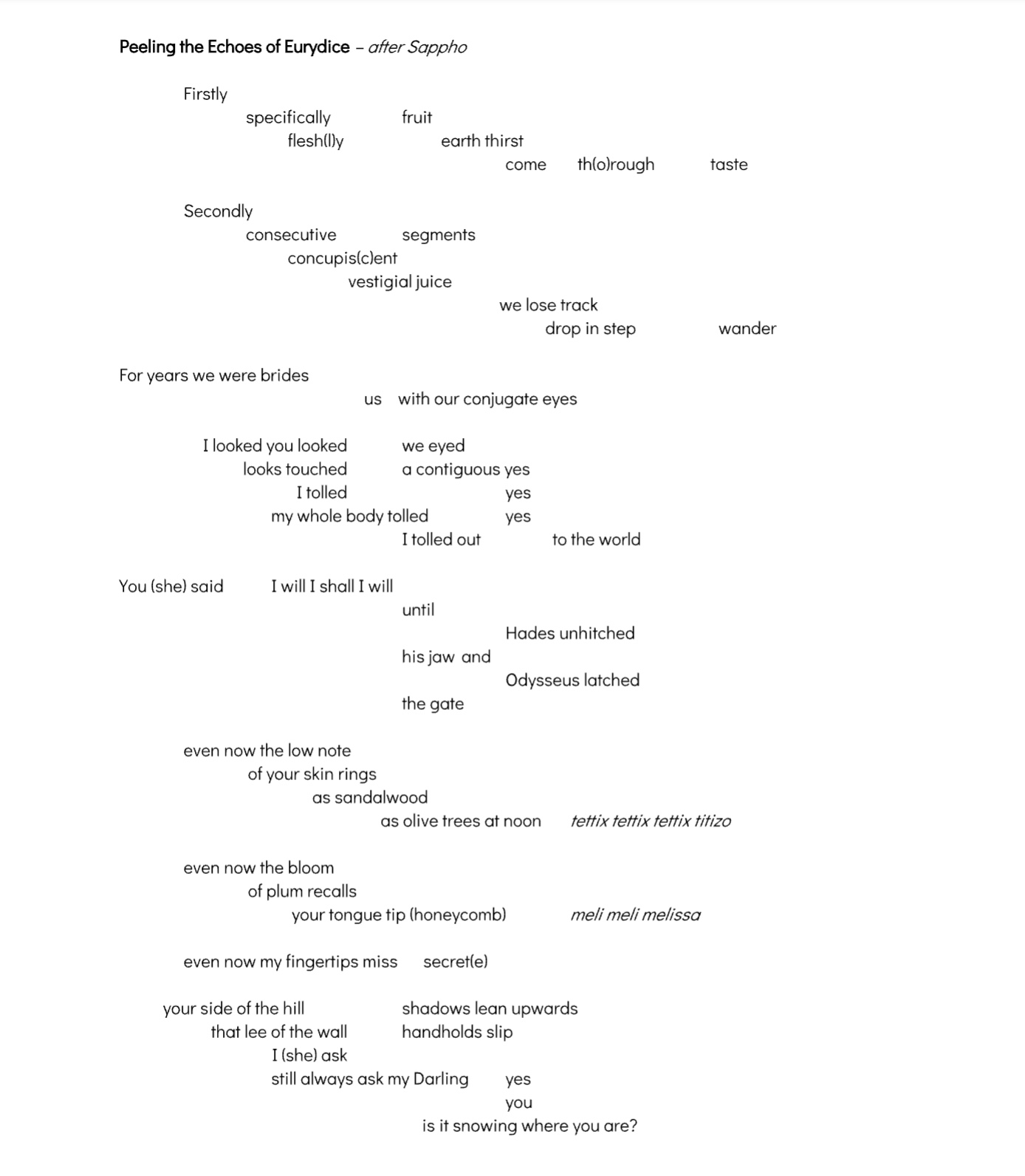Daphne
(It is predicted that by 2050 there will be at least one green autotropic person on Earth)
She came with a label tied to her toe: “Daphne”.
An ordinary cadaver, but young, too young
for an early death – her beauty subdued –
yet it made us gasp, her flared hips,
skin still downed like a ripe peach, fading
rose in her lips – we touched her with reverence
our fingers lingering just a little too long.
The first cuts to excise the veins and arteries
were difficult, destructive – messy – but science
buzzed in our heads: we were the first to try this.
Each of us felt uplifted, gods among men,
plumbing out blood, its intricate exchanges,
for the simple goodness of green: self-sufficiency
achieved, forests saved, prairies re-wilded,
chickens, pigs and cows retired to feral pastures.
For weeks she lay curled in sleep, a forest creature,
moss-coloured, her arms raised in dreams,
twining upwards, reaching, reaching.
We carried her into the sunlight, she stood up,
did not move. Her feet dug deep into the soil,
her arms stretched out, two drops rolled from her
blue staring eyes. She is evergreen,
her limbs cradle nesting birds, insects feed
on her small, fragrant flowers. At night
we hear her sigh, her lips wordless now.
In the winter we cover her in fleece,
she shivers so.
Sue Wood won first prize in Cinnamon Press’s Poetry Collection Award leading to the publication of her first collection Imagine yourself to be water, Cinnamon Press. She has also won second place in the Basil Bunting Poetry Competition, had her pamphlet Woman Scouring A Pot published by The Poetry Business as a winner in their competition. Widely published in various anthologies including The Forward Book of Poetry, PN Review, The Hippocrates Prize Anthology, In Protest:150 poems for Human Rights and Poems for the NHS. She has taught in Australia, South Africa and the UK, run creative writing sessions for mental health, doctors and older people. She lives near Oxford with two performing cats
Concerning the marriage of monsters
After the cheering has died down, her head shaved
and the bridal gown slashed to tatters,
she begs for clothes. Her stepmothers
shake their heads, suck their teeth.
The previous wives took pains
to ask for nothing. They give her a tablecloth
of lace so remarkable, a hundred virgins
went blind with the stitching.
Her husband watches
as his serving-women polish her limbs
with salt till she is pronounced faultless.
Gooseflesh hiccups across her stomach and thighs.
Denied mirrors, she makes do with the blades
of butter-knives to guide her smearing
of crushed charcoal around the eyes,
dressing her eyelids in mourning.
Visitors arrange themselves
amongst the forest of supper-couches
and ornamental tables. They sip wine and smirk
at her attempts at perfection.
She tries to cast no shadow; tries to scour herself
of thoughts and desires. Beneath her tight-bound veil,
the snakes seethe. She slumbers them
with milk and honey: a cup, a jug, an ocean of the stuff.
Writer and singer with post-punk band The March Violets, Rosie Garland‘s poetry collection What Girls Do In The Dark was shortlisted for the Polari Prize 2021. Val McDermid named her one of the most compelling LGBT+ writers in the UK today.

Elvire Roberts is a queer poet who works as a signed language interpreter. Her writing celebrates the doors that languages and cultures open in our minds and bodies. Her pamphlet North by Northnorth is published by Five Leaves press. www.elvireroberts.co.uk
